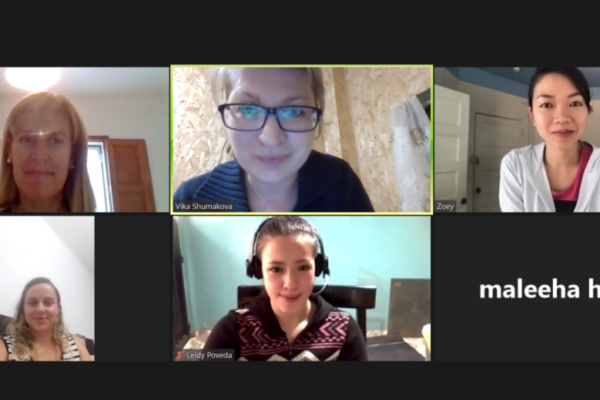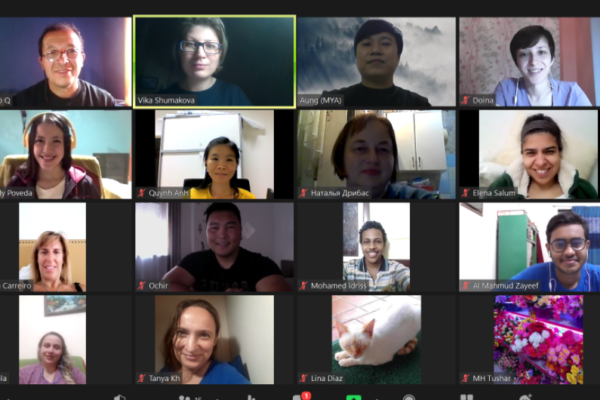It’s not always easy to come up with interesting thoughts or memories during a conversation. The good news is that it’s possible to train yourself to do it.
During one of my Speaking meetings, participants asked me the following question: “How do you come up with ideas when someone asks you a question you don’t know how to answer?”
She said that she had no problem with vocabulary but with stories or ideas to give a meaningful answer.
I think it’s a great question.
Have you ever been in a situation in which everyone shared exciting stories or experiences and you were like ‘hmm, I have nothing to tell you about’ or ‘my life is not that exciting/dramatic’?
It often happens not only in English but in our native tongue!
So, here’s how you can tackle this.
How to trigger your memories
Storytelling is a skill that can be developed or improved. Ideas don’t come out of nowhere.
We usually need a hint that will trigger our memory and remind us of something from our own life or books we read or movies we watched.
Have you ever noticed that we completely forget about some events of our life until some random thought, word or event brings them back. The older we get, the more such forgotten memories we’ll have.
This is a natural process. Our brain constantly eliminates unimportant things from the instant memory, hiding them in the back of our minds. To evoke those memories, we usually need a hint.
It could be a story, a word, a scent, a sound or almost anything that can trigger those memories.
How does it work
So, during that speaking session I first asked participants to share their treasured memory and then their most terrible memory.
These are questions you can’t answer immediately without thinking. To help them to come up with ideas, I shared a story from another meeting.
One of the participants shared that the most treasured moment of her life was the day her son was born. Although physically it was the most painful experience she had ever experienced, emotionally and mentally it was the happiest day of her life.
After that the participants started to share their stories. Guess what? Two out of four stories were about babies.
Do you see the connection? I bet you do:)
My initial story triggered their memories. One lady said that her labor had been terrible and it had been the most terrible day of her life despite the fact that she loves her children.
Another participant told about a day when she worked as a nurse in a maternity hospital and she had to work 48 hours without breaks because her colleague didn’t show up.
Watching a movie or reading a book can also trigger memories. Let’s say you watch a movie that contains an emotional scene of a father and a daughter, so it may bring back your own memories with your parents. The relationship could be different from what you see in the scene. It doesn’t matter. The thing is by seeing it you recall something that can become a story or a memory to share.
How to practice
Now, how can it help you to come up with interesting answers during your conversations?
It’s simple. Start noticing those triggers and train your brain to dig deeper for interesting memories.
Here are ways to practice it:
– Every time you consume information either via reading, listening, watching or talking, try to notice what associations and memories come to your mind during these moments.
– Find any ‘great questions for discussions/writing/stories’ on google and answer 1 question a day via speaking or writing. Eventually it will be much easier for you to come up with ideas.
Do you want to start working on that skill now? Great!
Below I shared a list of random words. Feel free to choose any word and share in the comments what memories it evokes for you.
Can’t wait to read your stories!
hospital
roses
New York
drama-queen
circus
Gum-tree
keyboard
love
Paris
horse
English
Photo by Jonathan Cosens.







I have a big issue with making a conversation not to die out in English. I can feel the words I want to say, but the words don’t pop up immediately, and that drains my confidence. I try to remember the idioms and the expressions, but that doesn’t help because: at the right in front of a conversation I become stuck to deliver my talk as I run out of words. These imperfections kick out the confidence in me, and I tend not to speak in English for quite a long time.
Thank you for sharing this with me, K Sap. This is a common problem for English learners. You might forget words because you’re nervous or you might not know how to use them in sentences. Usually, you can find how a word is used in context in dictionaries.
In my posts, I also share not only the meaning of the word but also examples of usage. Here’s also a post on the best ways to make words stick. I hope it helps.